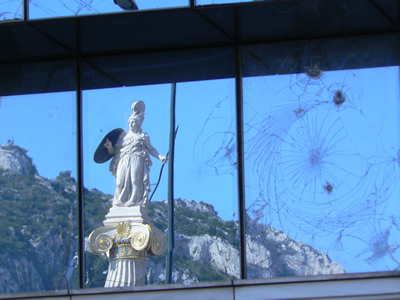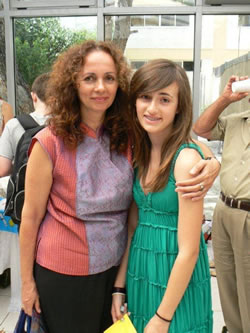|
Sunday morning, Pireos Street, a light blue door opens. We walk in and get to work, bags and bags of food to distribute, bags and bags of blankets, sleeping bags, used clothes, and a warning to "be prepared" when the gates open. My fifteen-year-old daughter and several classmates along with two adults spend the day helping in a homeless shelter in Central Athens that is so understaffed it is frightening.
We set the bags with shoes & clothes on the benches in a big yard leading to the outdoor kitchen where meals are prepared. The sidewalk is already packed with people waiting. Gates push open, junkies, old folks scramble for clothes, shoes, and then they rush to get on line to get their meal. They know the routine; I am the one who feels lost today.
Some fall asleep before they finish their meal; no, not sleep but stupor, a drug-induced stupor. Then an old Greek woman walks up to me with a photo and asks me, Have you seen him? Please have you seen him? I confess I am new at this shelter. I hold the photo out to others who work there asking someone, anyone to help. We find out that her son does indeed show up at the shelter to eat. So, she waits, she eats, she begs for a blanket, macaroni, a can of milk. I sneak out a bag full of items to her. No son shows up to eat.
A beautiful man (late 30s/early 40s) knocks on the light blue door and when I open I can hear the story being created in his head as he opens his mouth to speak to me. He is new at this game, this reality in Athens. His lips part to whisper a lie: "I came to get food for my mother."
I ask him to go around in the back where I believe lunch is still being served. When I look outside to see what is happening in the yard I see him waiting patiently to the side—the meals have finished. We glance at each other without saying a word. I sneak a bag of food and give it to him. He cups my hands into his and shakes them tightly to thank me. I cannot look him in the eyes. He could just as easily be sitting at a chic Kolonaki neighborhood cafe. That is the look he has and from the tight handshake I can tell he has just fallen through the cracks.
It is unbearable to watch people so desperate, so lost, so much Greece's problem, so much our problem, and there were not enough volunteers today. There are no words for what awaits this place. Thanks to our politicians this is the new world order in little old Greece.
I know I should pack my own bags and get out of this country before it collapses on itself but I am unable to. Perhaps the photo I have sent you of my daughter and me taken at her middle school graduation at the American Community School shows one of the reason why I stay, why I write, why I feel so much pain. I wanted her to grow roots here.
My daughter has all the resources at her school in Athens to carve a bright future, one I could not grasp myself as the daughter of uneducated immigrant parents who did one thing and one thing only—they worked two jobs their whole lives to protect my sister and me from the miserable conditions they left behind in Greece. It is ironic that I, an educated professional, planted myself back here to watch a new kind of collapse; not from a world war or nuclear destruction but an ethical war I witness every day.
Not much has changed here since the Greek dictatorship ended in 1974 even though it should have. Politicians rose to power, politicians fell out of favor from left wing to right wing, all promising the same thing to Greeks: we will save you, we will change you, we will help the country prosper. The world is witnessing what these promises delivered.
People have lost jobs and are not finding new ones. Friends are moving in with their elderly parents. Police visited my neighbor last week to change the locks because he has just lost his house, a house that has been in the family for at least two generations—it is shocking to watch. Four people will be out on the street. Also in our neighborhood is a retired government tax official who has three summer houses on an island, two in our neighborhood and an apartment with private parking in the chic Kolonaki area, acquired on a public servant's salary.
I have to write about this broken city all around me because writing cleanses my wounds; wounds carried over from generation to generation of Greeks who stayed behind, Greeks who immigrated, Greeks who lost the game, Greeks like me who were born elsewhere but chose to live here. I feel injected with story ideas, listening, observing those around me, being at the homeless shelter, watching the city change, watching myself change because I have fewer opportunities to earn money with my writing. There are drastic cuts in funds for public hospitals and schools, my neighborhood, city, country. I am an open pore taking in these radical changes to turn what I see into a poem, a story, an essay.
I don't know if it is my right to pass the hold Greece has on me to my child. I might be able to create stories or poems or sculptures out of what I feel, but I cannot tell her with straight-laced logical words why we are here, why we remain, why it is important not to abandon ship at this time.
Greece is more than a place; it is where my roots are, a primal memory woven inside me with passion, hunger, and a fleeting sense of peace I extract momentarily. Location, translation, creation, colliding cultures inspire me and allow me to fly away with my pen. It is the only way I know how to breathe.
©Amalia Melis, 2012

Reflection of Goddess Athena Statue, protector of Athens, Central Athens.
Photo Credit: Amalia Melis
| 


